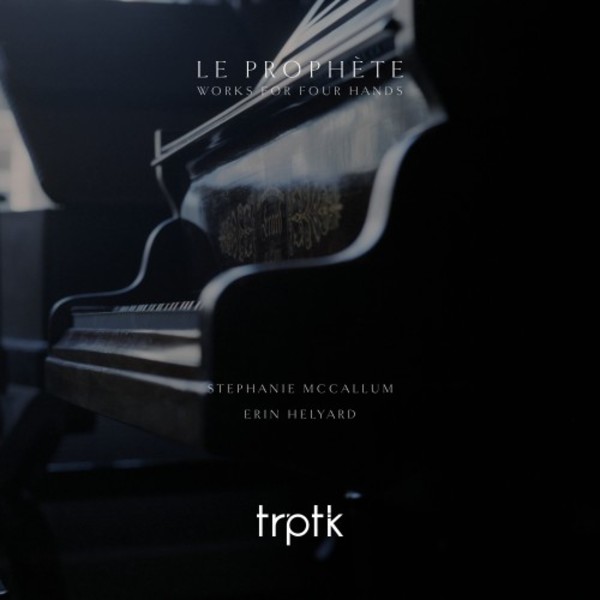
Le Prophete: Works for Piano Four Hands
Despatch Information
This despatch estimate is based on information from both our own stock and the UK supplier's stock.
If ordering multiple items, we will aim to send everything together so the longest despatch estimate will apply to the complete order.
If you would rather receive certain items more quickly, please place them on a separate order.
If any unexpected delays occur, we will keep you informed of progress via email and not allow other items on the order to be held up.
If you would prefer to receive everything together regardless of any delay, please let us know via email.
Pre-orders will be despatched as close as possible to the release date.
Label: Trptk
Cat No: TTK0005
Format: CD
Number of Discs: 1
Genre: Chamber
Release Date: 28th April 2017
Contents
Works
Grand Preludes, op.66: Selection of 9 trans. Vianna da Motta for piano four handsLe Prophete
Artists
Erin Helyard (piano)Stephanie McCallum (piano)
Works
Grand Preludes, op.66: Selection of 9 trans. Vianna da Motta for piano four handsLe Prophete
Artists
Erin Helyard (piano)Stephanie McCallum (piano)
About
Adrian Daub in Four-Handed Monsters: Four-Hand Piano Playing and Nineteenth-Century Culture has brilliantly surveyed nineteenth-century and early twentieth-century novels for traces of how the piano duet interacted with those who played and listened to them. Daub argues on the strength of a rich and provocative bed of primary literature that four-hand piano playing theatricalised nineteenth-century issues of subjectivity, community, eroticism, nationalism, and consumerism. One of the most compelling arguments in Four-Handed Monsters is Daub’s exploration of how four-hands music had a particular and especial relationship to consumption and commodification. Certainly, as the “proto-CD of nineteenth- century domestic culture,” four-hand music was mass-produced and consumed eagerly. The nineteen-year-old Friedrich Nietzsche’s Christmas wish-list in 1863, for instance, reads “(1) The Grand Duo by F. Schubert, arranged for four hands; (2) Düntzer’s edition of Goethe’s lyric poems.” Four-handed music and its performance was undoubtedly one of the important and influential components of nineteenth-century transnational musical culture. One would argue that it could be considered the most pervasive and important, by dint of its widespread agency.
Praised as a virtuosic and eloquent soloist as well as an inspired and versatile conductor, Erin Helyard is at the forefront of a new generation of young musicians who are inspired by the latest musicological and historical enquiry. Erin graduated in harpsichord performance from the Sydney Conservatorium of Music with first-class honours and the University Medal. He completed his Masters in 2005 in fortepiano performance and a PhD in Musicology in 2012 with Tom Beghin at the Schulich School of Music, McGill University, Montreal. He was named the Westfield Concert Scholar on fortepiano for 2009-2010 and from 2003 to 2012 Erin was a central member of the award-winning Montreal-based Ensemble Caprice. In Sydney, Erin is artistic director and founder of Pinchgut Opera and the Orchestra of the Antipodes.
Described as “one of Australia’s foremost pianists”, Stephanie McCallum has enjoyed an international career of over twenty five years, appearing on over forty CDs (including eighteen solo CDs) and in hundreds of live solo and concerto performances. Playing a repertoire from the eighteenth to the twenty first century she is especially noted for her performances of virtuosic music of the nineteenth century, particularly the music of Liszt and Alkan, and also for her advocacy of demanding contemporary solo and ensemble scores.
This product has now been deleted. Information is for reference only.
Error on this page? Let us know here
Need more information on this product? Click here